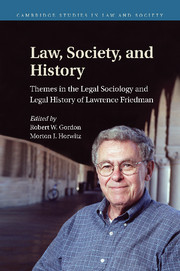Book contents
- Frontmatter
- Contents
- Contributors
- Introduction
- PART I OVERVIEWS AND ASSESSMENTS OF FRIEDMAN'S WORK
- PART II APPLICATIONS OF CONCEPTS, INSIGHTS, AND METHODS IN FRIEDMAN'S WORK
- PART III THE LEGAL PROFESSION
- PART IV LAW AND LARGE AREAS OF SOCIAL LIFE
- PART V FACTS FROM THE UNDERGROUND: DIGGING LEGAL HISTORY OUT OF THE CELLAR
- PART VI PERSPECTIVES FROM OTHER CONCEPTUAL WORLDS
- 20 Sociological Jurisprudence – Impossible but Necessary
- 21 How American Legal Academics' Positions on Economic-Efficiency Analysis, Moral Philosophy, and Valid Legal Argument Disserve Law and Society Empirical Research
- Index
- Titles in the series
- References
21 - How American Legal Academics' Positions on Economic-Efficiency Analysis, Moral Philosophy, and Valid Legal Argument Disserve Law and Society Empirical Research
Published online by Cambridge University Press: 07 October 2011
- Frontmatter
- Contents
- Contributors
- Introduction
- PART I OVERVIEWS AND ASSESSMENTS OF FRIEDMAN'S WORK
- PART II APPLICATIONS OF CONCEPTS, INSIGHTS, AND METHODS IN FRIEDMAN'S WORK
- PART III THE LEGAL PROFESSION
- PART IV LAW AND LARGE AREAS OF SOCIAL LIFE
- PART V FACTS FROM THE UNDERGROUND: DIGGING LEGAL HISTORY OUT OF THE CELLAR
- PART VI PERSPECTIVES FROM OTHER CONCEPTUAL WORLDS
- 20 Sociological Jurisprudence – Impossible but Necessary
- 21 How American Legal Academics' Positions on Economic-Efficiency Analysis, Moral Philosophy, and Valid Legal Argument Disserve Law and Society Empirical Research
- Index
- Titles in the series
- References
Summary
Lawrence Friedman's work is certainly not atheoretical. However, the hallmark both of his scholarship and of the law and society movement to whose development he has made such a great contribution is the recognition that for a theory to be valuable it must explain or predict specified facts.
American law professors have long recognized that success as a transaction lawyer or litigator often depends at least as much on knowledge of the facts of the situation or case as on doctrinal knowledge or skill in legal argument. However, until fairly recently, these academics have done little empirical research themselves; instead they have made scholarly choices that implicitly assume that such research has little bearing on the academic questions their research investigates. Yet over the past two decades, American law professors have revised upward their assessment of the contribution that law and society empirical research can make to legal scholarship. This reassessment is manifest in (1) a vast increase in the amount of such empirical research that American law faculties conduct, (2) the fact that the plenary session of the 2006 Annual Meeting of the Association of American Law Schools was devoted to “Empirical Research: What Should We Study and How Should We Study It?” and (3) the decision of the Cornell, New York University, and University of Texas law schools to sponsor a series of annual conferences on empirical legal studies.
- Type
- Chapter
- Information
- Law, Society, and HistoryThemes in the Legal Sociology and Legal History of Lawrence M. Friedman, pp. 395 - 430Publisher: Cambridge University PressPrint publication year: 2011
References
- 1
- Cited by



